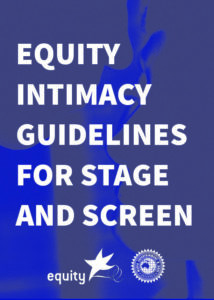Intimacy Guidelines for Stage and Screen

Developed by a dedicated Equity Committee over 18 months, these Guidelines provide a framework for the stage and screen industries when creating, performing or recording performances of intimate scenes.
Over the past couple of years, we have seen a great awakening in our industry about the health and safety of performers both on stage and screen, but also in their other engagements with the industry.
#MeToo was a watershed. It was the moment when the unspoken culture of sexual harassment, bullying, the ‘casting couch’ and all the other dirty secrets finally came into the open and women especially felt empowered to say ‘enough is enough’.
MEAA collaborated with other industry bodies to develop a code of conduct governing sexual harassment, harassment and bullying for stage and screen. These intimacy guidelines are the next logical step.
What are the MEAA Intimacy Guidelines for Stage and Screen?
These Guidelines provide a framework for the stage and screen industries when creating, performing or recording performances of Intimate Scenes.
The intent is to create respectful processes for everyone whose practice intersects with intimate content to ensure that they are prepared, supported and able to do their best and most daring work.
Why do we need intimacy guidelines?
Over the past couple of years, we have seen a great awakening in our industry about the health and safety of performers both on stage and screen, but also in their other engagements with the industry.
#MeToo was a watershed. It was the moment when the unspoken culture of sexual harassment, bullying, the ‘casting couch’ and all the other dirty secrets finally came into the open and women especially felt empowered to say ‘enough is enough’.
MEAA collaborated with other industry bodies to develop a code of conduct governing sexual harassment, harassment and bullying for stage and screen. These intimacy guidelines are the next logical step.
When and how should they be used?
The Guidelines cover all stages of the creative process, from casting, auditions and pre-production, preparation, rehearsal, performance and post-production. It is recommended that all cast, crew and others involved in the production of a performance for stage or screen which includes an intimate scene should familiarise themselves with the Guidelines.
Intimacy means something different to each Performer and in each circumstance. Notions of intimacy are shaped by a Performer’s cultural background, abilities or disabilities, gender identification, age and sexuality. This also influences how a Performer goes about giving or seeking consent.
Consequently, these Guidelines deal with best practice for creating Intimate Scenes, as defined broadly by the Performers themselves to cover any activity, interaction or exposure occurring within their close personal space.
How were they developed?
The Intimacy Guidelines were developed over an 18 month period involving MEAA, Screen Producers Australia (SPA), Australian Directors’ Guild (ADG), Casting Guild of Australia (CGA), the Australian Writers’ Guild (AWG), MEAA National Stunt Committee, Fight Directors, Theatre Directors, Stunt Co-ordinators, Intimacy Co-ordinators and Intimacy Directors. The Australian Writers’ Guild (AWG) has also been consulted throughout the process.
Recommendations are drawn from the Equity New Zealand Intimacy Guidelines, Ita O’Brien’s Intimacy On-Set Guidelines (UK), Guidance Notes for Screen Directors (Directors UK), Intimacy Co-ordinator Standards & Protocols (SAG-AFTRA) and ‘The Pillars’ created by Intimacy Directors International (US).
Also included are the contractual obligations when engaging Performers to appear nude, semi-nude or in sex simulated scenes under MEAA Equity Agreements, notably the Actors’ Feature Film Collective Agreement (AFFCA), the Actors’ Television Programs Agreement (ATPA) and the MEAA Theatre (Performers’ Collective) Agreement.
Performers’ union releases Australia’s first intimacy guidelines for stage & screen with industry-wide support
Australia’s first Intimacy Guidelines for Stage and Screen will establish new processes for work involving nudity, intimacy, simulated sexual activity and sexual violence to ensure performers are prepared, supported and able to do their best and most daring work.
After 18 months of consultation by the Media, Entertainment & Arts Alliance (MEAA) with performers, directors, producers, writers, educators, agents and casting directors, the guidelines are believed to be the most comprehensive anywhere in the world.
“I’m very proud our union has led the way on the development of these guidelines because they have been needed for a long time,” says Australia actor, director, producer and MEAA Equity federal president Jason Klarwein. “The expectation is that these guidelines are used on every production in the country”.
Equity national director Andrew Crowley says the creation of the guidelines was a huge collaborative effort. “Our former president Chloe Dallimore and our dedicated Intimacy Committee has done a remarkable job of creating clear procedures for intimate work that still keep play, trust and goodwill central to the creative process.”
Actor and Intimacy coordinator Michala Banas believes the industry has been in desperate need of boundaries and processes for the creation of intimate work. “Finally, with the Intimacy Guidelines, we have an essential tool to support the navigation of intimate content in our industry,” says Banas. “Creatives across the board are relieved to know that now there is a pathway to make our sets safer for everyone. I look forward to seeing them put into practice.”
The guidelines encourage the participation of an intimacy co-ordinator or Intimacy Director where appropriate; and guide best practice, particularly when a production does not engage an Intimacy Co-ordinator or Intimacy Director.
The guidelines were created in consultation with and are endorsed by MEAA, Screen Producers Australia (SPA), Australian Directors’ Guild (ADG), Casting Guild of Australia (CGA), MEAA National Stunt Committee, in addition to consultation with individual performers, fight directors, theatre directors, stunt coordinators, intimacy coordinators and intimacy directors. The Australian Writers’ Guild (AWG) was also consulted throughout the process.
Theatre director Jessica Arthur says the Intimacy Guidelines are of the “utmost importance” in creating safe and supportive practices for those working in theatre. “I look forward to these guidelines contributing to a more transparent, secure and open creative environment.”
The comprehensive guidelines cover all instances for a stage or screen production that may require intimate work; auditions, preproduction, rehearsals, preparation, performance and post production.
When it comes to auditioning, the guidelines stipulate that there are no circumstances where nudity or semi-nudity should ever be required and that the casting director or producer will provide the performer and/or their agent with the audition script at least 48 hours in advance of the audition with the required action of the intimate scenes detailed.
Dave Newman, president of the Casting Guild of Australia, says an audition is a workplace environment like any other and no artist should ever feel uncomfortable or compromised in an already difficult situation. “These common sense guidelines provide a clear path forward that should be adopted by all aspects of the industry from amateur productions to professional environments. The CGA also encourages individual artists to be empowered by these guidelines, to know your rights in relation to scenes involving intimacy – and to call out bad practice where necessary.”
Melbourne Theatre Company casting director Janine Snape described the guidelines as “invaluable tool” that have the full support of Melbourne Theatre Company. “As an industry we have an obligation to create respectful and safe processes for intimate work.”
Open communication and “informed consent” lie at the heart of the guidelines, which require performers’ consent for each and every intimate action. The guidelines point out that in order to genuinely consent “a performer must be informed of the intimate scene and its specific requirements in advance.”
“It is so crucial that informed consent is at the heart of intimacy work on screen and stage,” says filmmaker and president of Australian Directors’ Guild, Samantha Lang. “I am encouraged that our industry guilds have worked together to create these intimacy guidelines. When observed they will benefit all those who work in our profession. The Australian Directors’ Guild fully supports the guidelines and will certainly advise directors to adhere to them on all future projects”.
The new respectful processes also have the support of Australian screen producers, with many consulted by their industry guild, Screen Producers Australia (SPA), during the development of the guidelines.
“Screen Producers Australia is pleased to support Equity’s Intimacy Guidelines for Stage & Screen so that everyone on set knows what to expect and performers can do their best work from a place of informed consent,” says SPA CEO Matt Deaner.
Producer Samantha Turi of Australian television production company Playmaker says her company has thrown their support behind the guidelines because the type of consultation and open communication promoted by the guidelines leads to “a harmonious work environment, which in turn leads to the highest standards of performance and quality of production.”
Australia performer Jamila Main was among those on the Intimacy Committee responsible for bringing the much-needed guidelines to life. “Whether you’re working in professional, independent, community, or amateur theatre or screen, or in an educational institution, these Intimacy Guidelines are here to support everyone involved to advocate for their safety and wellbeing while telling stories.”
